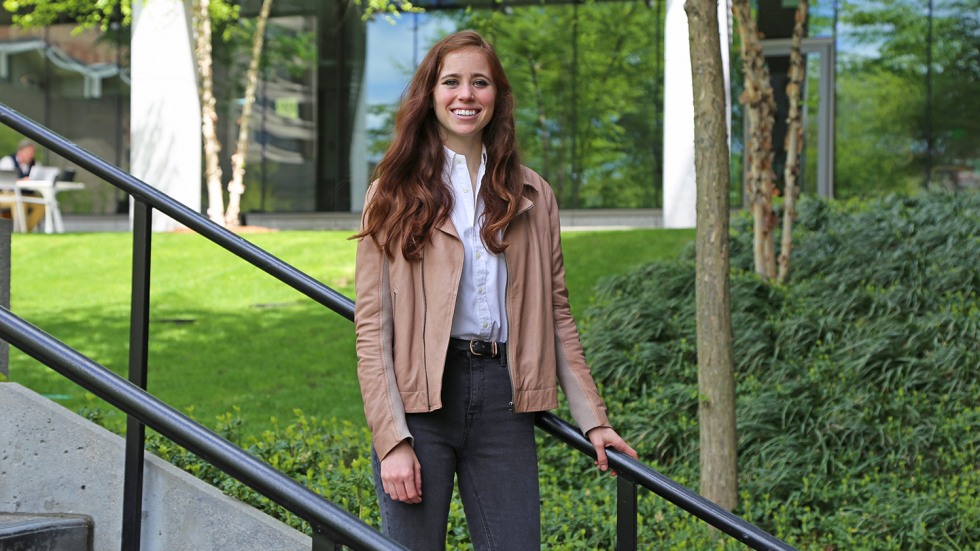The genesis of MediCircle, winner of the 2021 Brown Venture Prize to empower the most advanced student entrepreneurial opportunity, is a result of a simple data collection project back in 2019. Eliza Sternlicht was the biomedical engineering division lead of the group emc^2, (Engineering Medical Care Change), a campus engineering startup funded by the Rothberg Catalyzer, where entrepreneurs work to advance technologies for medical devices, create innovations, and translate their ideas into solutions. She wanted to create an automated anesthesia delivery system, and began to survey anesthesiologists to identify areas that needed improvement.
“I knew I was going to need enough physicians saying this is somewhere they would want to see improvement. What was really interesting and unexpected was the number one area they all agreed needed correction was in waste management,” she said.
Investigating further, Sternlicht determined waste was not isolated to operating rooms, but that a quarter of medications dispensed to patients ultimately end up in incineration facilities. Having met Jack Schaeffer at orientation a year prior and striking an immediate friendship, Sternlicht was quick to turn to him and say, “I think this is a real problem and I think it’s somewhere we could enact positive change.”
It was easy for the duo to quickly discover the vast dollar amounts being lost on pharmaceutical waste and a business model that would collect, certify and redistribute unused medication began to take shape.
“We drove to every nursing home within a 50-mile radius,” Sternlicht said. “Our original intention was to work with long-term care facilities, but we had an interview with another redistributor who said bluntly, ‘You're moving medications that are all worth less than $100 and while that's important, you can't really spearhead a project with that.’
“Then we started looking into medications that are being wasted at a higher percentage that are also worth a lot more, and that's when we realized that chemotherapy holds such an immense amount of waste. Forty-one percent of patients have unused oral chemotherapy pills, and those on average cost $10,000 a month. If 1.8 million Americans are diagnosed with cancer annually, and then, at the same time, forty-six percent of them are having to make these horrible decisions between food and clothing or affording chemo, and this is only one piece in their broader, and costly, treatment program, we knew we had to do something,” said Sternlicht, who ultimately intends to enter medical school.
Sternlicht focuses mainly on the medical side of the venture, while Schaeffer takes the business and financial lead. “Brown’s connections have been instrumental to our work,” Sternlicht said. “We’ve definitely had the support of faculty. Jack works a lot closer with the Nelson Center. I've been working more with people in the med school and talking to professors who've been amazing and supportive. Professor [Anita] Shukla is my PI, and she's been very inspirational. As a woman in STEM, that's so empowering to see someone be so accomplished in their field. I took Professor [Anubhav] Tripathi’s Topics in Translational Research course last semester, which was perfect timing. There’s been so much support on all levels — academic, professional, and career advising.
“The Brown Venture Prize also definitely helped us to be taken seriously. We’ve learned that the more persistent you are, eventually you’ll open some door,” she said.
When patients return unused medication, pharmacies will donate it to the financially attractive MediCircle, according to Schaeffer, because it cuts disposal costs and offers tax credits. “It’s not the most novel idea,” Sternlicht concedes, “but it also was only really made possible within the past ten years because of the standardization of national drug codes.”
MediCircle’s strict model only operates with medications sealed in blister packs, and each donation is sent to isolation before a team of pharmacists recertify each medication. The team also has partnerships in the works for different types of spectrometry to check for impurities.
“Our processes are more rigorous than the standard pharmacy, just because we know that these medications are stigmatized [about being returned and reissued]. Reliability is of the utmost importance to us. We're never going to be dispensing medications that we're not 100 percent sure of their quality,” she said.
Currently, the chemotherapeutics are sent to MediCircle’s facilities in New Jersey, where the company uses technology to compile the medication history log. “The technology has been fun to develop. It allows us to enter the national code and compile the history of the medication, redacting all patient data since we’re not at all interested in that, and allowing us to be HIPAA compliant, along with all of the points of quality assurance we're doing. Then it goes back to pharmacies, where it can be dispensed to financially-burdened patients.”
Currently, medical redistribution is legal in 39 states, with legislation in progress to make it legal in the remaining U.S. states. With its venture prize winnings, MediCircle plans to begin its pilot program on August 1, with the goal of ensuring and refining the technology so that the model works as planned. Medications in the pilot program will be redistributed to charitable clinics.
